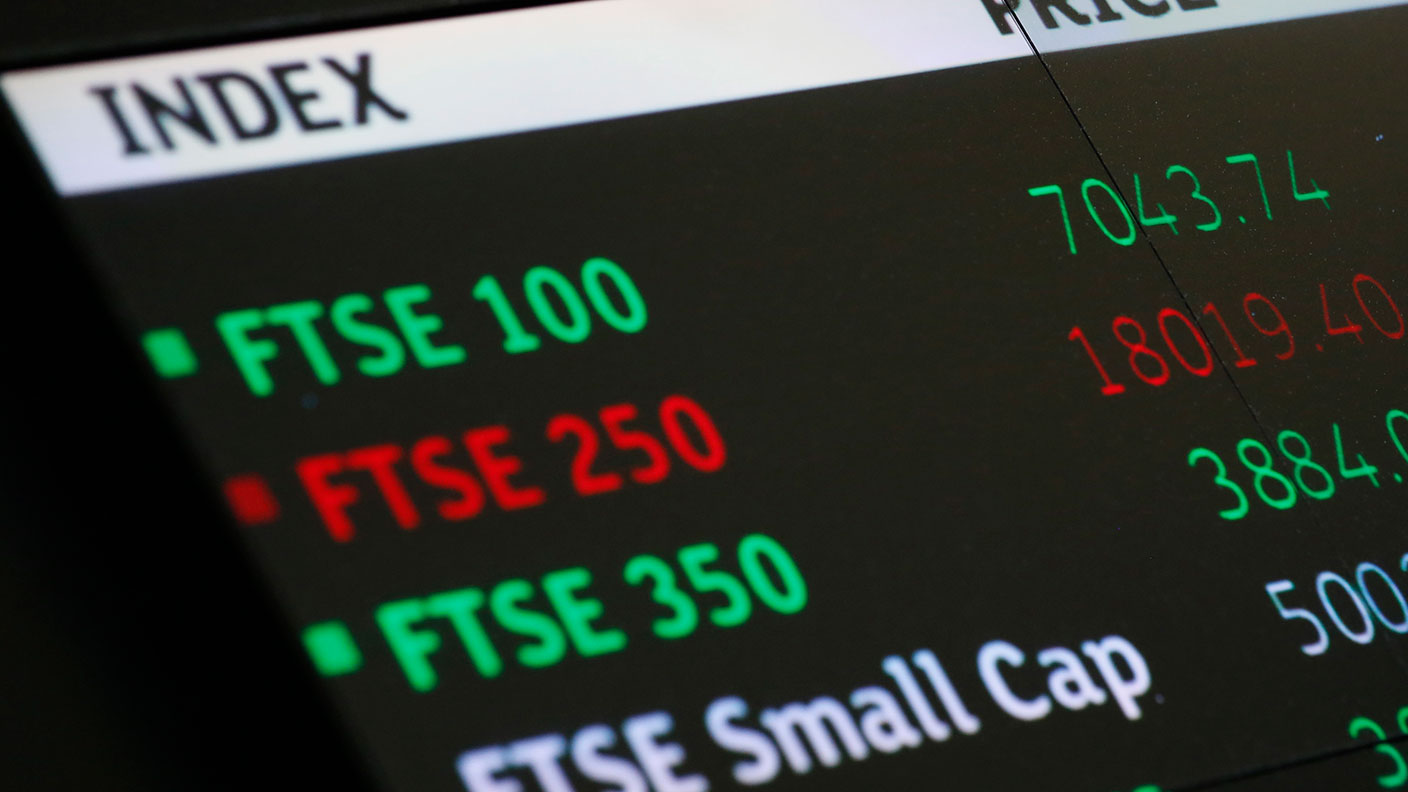5 buys: MoneyWeek’s best dividend ETFs
Exchange traded funds (ETFs) have only been around for three decades, but they have proved hugely popular, combining flexibility and low cost. Here, Rupert Hargreaves picks the five highest-yielding ETFs on the market now.


Get the latest financial news, insights and expert analysis from our award-winning MoneyWeek team, to help you understand what really matters when it comes to your finances.
You are now subscribed
Your newsletter sign-up was successful
Want to add more newsletters?
Investors looking for income should take a look at the best dividend ETFs on the market.
ETFs provide flexibility other structures do not, which can make them a good way for investors to build exposure to different market themes.
ETFs vs open-ended funds: What’s the difference?
This subject can be a bit complex, so I will try and keep it as simple as possible. There are really two different categories of investment funds, open-end investment funds and closed-end funds.
Try 6 free issues of MoneyWeek today
Get unparalleled financial insight, analysis and expert opinion you can profit from.

Sign up to Money Morning
Don't miss the latest investment and personal finances news, market analysis, plus money-saving tips with our free twice-daily newsletter
Don't miss the latest investment and personal finances news, market analysis, plus money-saving tips with our free twice-daily newsletter
Open-end funds take money from new investors, invest this cash in the portfolio and then issue new shares in the fund to the new investor (shares are bought back when investors exit). This structure means it is difficult to hold less liquid instruments like bonds and small-cap shares as it might be harder to acquire these assets in the quantities required to satisfy investor contributions and deposits.
Meanwhile, closed-end funds have a limited number of shares in issue (although they can issue more). As such, managers always know how much capital they have available to invest, and can deploy it accordingly.
A quirk of this structure is that closed-end funds can trade at a discount to their underlying net asset value if more investors are selling rather than buying (or at a premium if the situation is reversed). That can’t happen with open-end funds as these investors will have their shares bought back.
Investment trusts are a good example of closed-end funds, while Lindsell Train Global Equity is a great example of an open-end investment vehicle.
ETFs bridge the best of both worlds. They have a fixed number of shares in issue, but can issue and buyback stock if needed at any point.
What’s more, unlike most OEICs and unit trusts, shares can be bought and sold at any point in the trading day. This means it is easier for investors to convert their assets to cash. It can take several days to exit open-end funds.
Low costs means more money for investors
A handful of providers dominates the ETF market, which gives the asset class another advantage over traditional funds.
Most ETFs track market indices, meaning costs are quite low to begin with. However, the economies of scale in the industry have pushed costs down even further. Some of the best dividend ETFs don’t track an index, but do offer lower costs than their actively managed competitors.
Still, a disadvantage of using these vehicles is the fact that as most are designed to just track indexes – they won't outperform.
So there are benefits and drawbacks to using ETFs to invest. Some investors might prefer the strategy, while others might want to avoid it altogether.
The best dividend ETFs on the market today
For those investors who think ETFs offer something different, here are the five highest-yielding income ETFs on the market today.
| Fund | Yield (%) | Ongoing Charge (%) |
| SPDR® S&P UK Dividend Aristocrats UCITS ETF | 4.04 | 0.3 |
| iShares UK Dividend UCITS ETF | 6.5 | 0.4 |
| WisdomTree UK Equity Income UCITS ETF | 6.1 | 0.29 |
| FTSE All-World High Dividend Yield UCITS ETF | 4.0 | 0.29 |
| Fidelity Global Quality Income ETF Inc | 2.8 | 0.4 |
All of the ETFs listed above are designed to track an equity income index. I should also note that the yield figures above are a trailing 12 month historical basis. Therefore, they may not be reliable indicators of future income.
These funds have made it onto MoneyWeek’s list of the best dividend ETFs due to their low costs and high yields.
I also like the international diversification offered by the likes of the Fidelity Global Quality Income ETF and FTSE All-World High Dividend Yield UCITS ETF.
Both of these funds own geographically diversified portfolios of equities. Although their overriding aim is to generate income, their global focus also means that they have a better track record of producing capital growth as well.
The Fidelity Global Quality Income ETF also has a great deal more flexibility in its investment mandate. It does not have to track an index, and so far, this has helped the fund outperform the Global Equity Index benchmark. Over the past five year the fund has produced a total cumulative return of 74% compared to 36% for the benchmark.
The iShares UK Dividend UCITS ETF tops the list of the best dividend ETFs on a yield basis. The £860 million fund is dominated by FTSE 100 dividend giants such as Imperial Brands (LSE: IMB), Rio Tinto (LSE: RIO) and Legal & General (LSE: LGEN).
Owning this ETF could also help investors build exposure to a basket of cheap UK blue-chips. The average price-to-earnings (P/E) ratio of the portfolio is 8.5.
That said, the fund is one of the more expensive options on this list with an ongoing charges figure of 0.4%. While still much lower than the average price investors will pay for an active fund, it’s still a bit on the high side for an ETF.
Get the latest financial news, insights and expert analysis from our award-winning MoneyWeek team, to help you understand what really matters when it comes to your finances.

Rupert is the former deputy digital editor of MoneyWeek. He's an active investor and has always been fascinated by the world of business and investing. His style has been heavily influenced by US investors Warren Buffett and Philip Carret. He is always looking for high-quality growth opportunities trading at a reasonable price, preferring cash generative businesses with strong balance sheets over blue-sky growth stocks.
Rupert has written for many UK and international publications including the Motley Fool, Gurufocus and ValueWalk, aimed at a range of readers; from the first timers to experienced high-net-worth individuals. Rupert has also founded and managed several businesses, including the New York-based hedge fund newsletter, Hidden Value Stocks. He has written over 20 ebooks and appeared as an expert commentator on the BBC World Service.
-
 What do rising oil prices mean for you?
What do rising oil prices mean for you?As conflict in the Middle East sparks an increase in the price of oil, will you see petrol and energy bills go up?
-
 Rachel Reeves's Spring Statement – live analysis and commentary
Rachel Reeves's Spring Statement – live analysis and commentaryChancellor Rachel Reeves will deliver her Spring Statement on 3 March. What can we expect in the speech?
-
 The top healthcare funds to buy
The top healthcare funds to buyTips Increasingly rapid progress in drugs and healthcare technology makes these trusts top tips, says Max King.
-
 A private equity approach to public markets
A private equity approach to public marketsTips A different approach to capitalising on low UK equity valuations.
-
 Private equity’s discount dilemma
Private equity’s discount dilemmaTips Many trusts trade on wide discounts, but there’s no reason to think that valuations are overstated.
-
 10 dirt-cheap Reits to buy now
10 dirt-cheap Reits to buy nowTips Real estate investment trusts (Reits) are out of favour due to rising interest rates and fear of weak demand. The sell-off has been so indiscriminate that many now offer compelling value, says Rupert Hargreaves.
-
 7 infrastructure investment trusts for income and growth
7 infrastructure investment trusts for income and growthTips These alternative investment trusts with international exposure could provide investors with an attractive income stream as well as capital growth, says Max King
-
 11 investment trusts for inflationary times
11 investment trusts for inflationary timesTips Inflation eats away at the value of your money, but these investment trusts can help you grow your wealth.
-
 The MoneyWeek portfolio of investment trusts – March 2023 update
The MoneyWeek portfolio of investment trusts – March 2023 updateTips A decade ago we set up the MoneyWeek portfolio of investment trusts. It proved a success, says Andrew Van Sickle.
-
 Green shoots for global markets in 2023?
Green shoots for global markets in 2023?Advertisement Feature There are many risks for the global economy in 2023, but there are also encouraging signs. Asia is benefitting from the reopening of China and improving investor confidence. Reliable cash flow and dividends are likely to be highly valued by investors this year